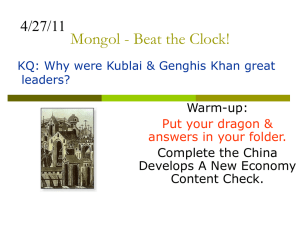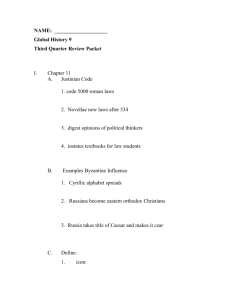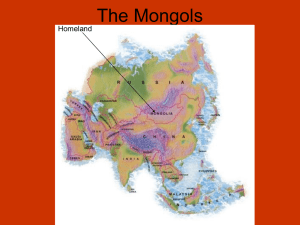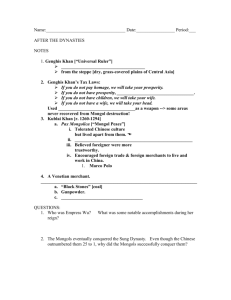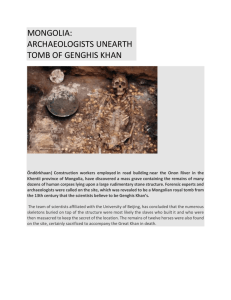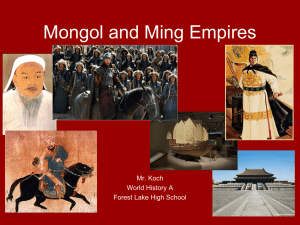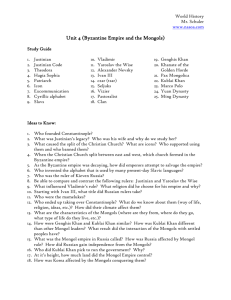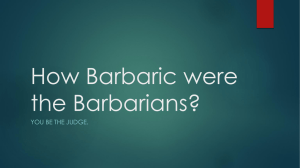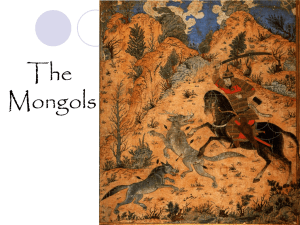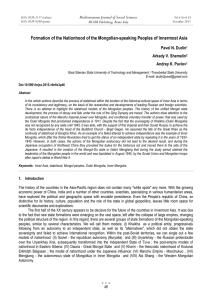Genghis Khan
advertisement
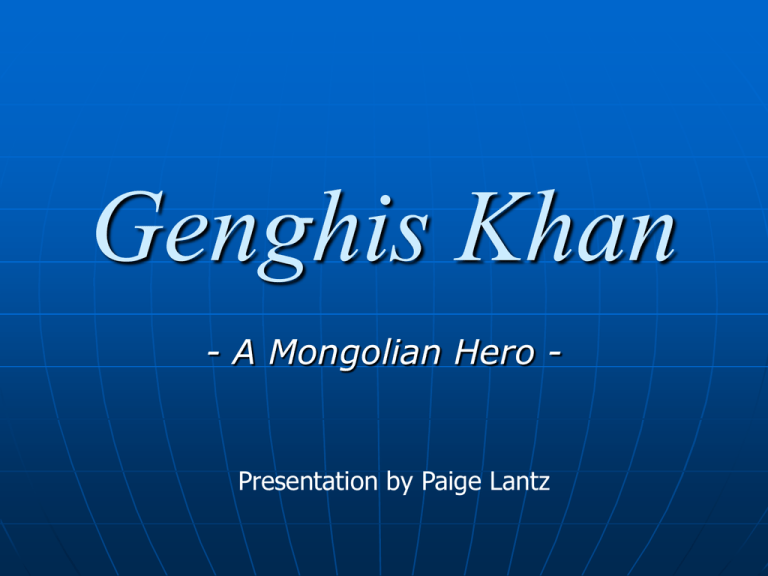
Genghis Khan - A Mongolian Hero - Presentation by Paige Lantz Mongolia and Mongols Seen by Americans as relatively insignificant Thought of as barbarians Mostly pictured on horseback wielding bows and arrows Mongolia ◦ Between Russia and China ◦ 3 x size France ◦Sparsely populated Interesting Population Facts ~ Roughly 3 million people ~ Population density 1.36/ square kilometer ~ More animals than people (ratio 12:1) ~ 50% Rural: 50% Urban ~ 90% of population ethnic Mongolian ~ Other 10% made up of Kazakh, Russian, Chinese and other Ulan Bator Capital city Largest city ¼ of the total population of Mongolia lives there Rural Population - Nomadic herders - Animal husbandry - Felt tent homes called Yurts Urban Population - Huge metropolis - Like any other city - All kinds of workers Mystery of the East Household Name Around the World ~Genghis Khan~ 1162-1227 ~to the country~ ~and to the people~ The Stone Age Archaeological evidence of humans in the area 100,000-200,000 yrs ago Early humans found to be living in the area south of the Gobi desert The Bronze Age 1st millennium Early humans move into Mongolia’s heartland Iron Weapons 3rd century B.C. Invention of weapons leads to raids into China Early Mongols Small nomadic tribes Very aggressive to their enemies Invaded early China Very decentralized -Constant battle over land between the two countries -Lasted thousands of years Chinese Turkic Original Leader Kabul Khan Unification of Mongol tribes 11th and 12th centuries 1162 -Temujin is born Grandson of Khan (or ruler) of leading clan Later to be known as Genghis Khan Father killed by Tatars when twelve Rejected by clan as leader Family sent into exile Family taken in by Keriet clan Gained rank and leadership in adopted clan By age of 20 had returned to birth clan and seized control Tribal Alliances Leading to Rule Had control over adopted clan Regained control of birth tribe Strength of leadership led to admiration of other clan leaders Backing of other clans leads to leadership of entire Bonjigin tribe Genghis’ contributions to the Mongols Military Empire Military Unification of Mongol tribes Organization of previously random attacks Continuously successful invasions Gained and held control of lands Expansion of an empire By 1213 empire had extended as far south as the Great Wall of China By 1215 empire had reached the area of what is now Beijing By 1218 empire extended as far west as Lake Balkhash Empire also reached Caspian Sea to the west and the Persian Gulf to the south Strategies to create an empire Harnessed the tribe’s tendency for war Organized the tribes Used tactics never before used in battle Used strategy (not just force) to win Total Accomplishments ~ United over 80 Mongolian tribes ~ Mongol Empire during his reign was most powerful nation on earth at that time ~ Era of his reign known as the “Golden Era” in Mongolian History ~ Created military strategies more successful than had ever been seen before Genghis Khan A national hero? 1911-1991 Mongolian independent, but tied to soviet Union 1991-Today Mongolian nationalism a replacement for Soviet-style Communism What do the people think? The Urban Population Chinggis (Genghis) Hotel ~ Located in Ulaanbaatar ~ Sees Genghis as military genius, and overlook his atrocities ~ Want to study more in depth ~ Are proud that he is known by the rest of the world The Rural Population ~ More concerned with raising their children and animals ~ Are proud of Khan’s world recognition World View Washington Post ~ Named Khan best leader of the last millennium ~ And called him an elite person of the millennium World Academy of Chinggis Khan ~ Researching his life and achievements more thoroughly ~ Globally educate everyone as to khan’s philosophies Bibliography 1) Akiner, Shirin. “Mongolia Today”. Kegan Paul International. London, England. 1991. 2) Bawden, C.R. “The Modern History of Mongolia”. Frederick A. Praeger, Inc. New York, N.Y. 1968. 3) Goldstein, Melvyn C. “The Changing World of Mongolia’s Nomads”. University of California Press. Berkley, C.A. 1994. 4) Hedin, Sven. “Across the Gobi Desert”. Greenwood Press. New York, N.Y. 1968 5) Lattimore, Owen. “Nationalism and Revolution in Mongolia”. J. Brill. Leiden. Netherlands. 1955. 6) Lattimore, Owen, “Nomads and Commissars”. Oxford University Press. New York, N.Y. 1962. 7) Lattimore, Owen. “The Mongols of Manchuria”. Howard Fertig, Inc. New York, N.Y. 1969. 8) Murphy, George. “Soviet Mongolia”. University of California Press. Berkely, C.A. 1966. 9) Rupen, Robert. “Mongols of the Twentieth Century”. Indiana University Publications. Vol. 37 Bloomington, I.N. 1964. 10) Worden, Robert. “Mongolia, A Country Study”. Library of Congress. <http:///cweb2.loc.gov/cgi-bin/query/r?frd /cstdy:@field(DOCID+mnoooo)>. 2003.
